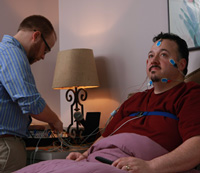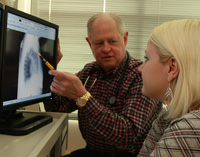What to Expect
 For a sleep study, you spend the night at our sleep center. You come in after dinner, and we welcome you and tell you about the diagnostic process. The sleep technologist carefully applies sensors to your head and body. Then you retire to a sleep rooms to read or watch TV, just as you normally do at home.
For a sleep study, you spend the night at our sleep center. You come in after dinner, and we welcome you and tell you about the diagnostic process. The sleep technologist carefully applies sensors to your head and body. Then you retire to a sleep rooms to read or watch TV, just as you normally do at home.
When you go to bed, technicians monitor your sleep from a remote computer station, recording brain waves, eye movements, breathing, oxygen levels, heart rate and muscle activity. Video and audio recordings provide additional test data.
 Dr. Hamner reviews your test results and talks with you in a follow-up visit about your diagnosis and treatment. Treatment can involve diet, exercise, respiratory devices, or other approaches. In one treatment for sleep apnea, for example, patients sleep with a breathing device such as the Continuous Positive Airway Pressure (CPAP) system. If a CPAP or other respiratory device is prescribed, our technicians fit and adjust them to the patient. Follow-up visits check on sleep and health improvements.
Dr. Hamner reviews your test results and talks with you in a follow-up visit about your diagnosis and treatment. Treatment can involve diet, exercise, respiratory devices, or other approaches. In one treatment for sleep apnea, for example, patients sleep with a breathing device such as the Continuous Positive Airway Pressure (CPAP) system. If a CPAP or other respiratory device is prescribed, our technicians fit and adjust them to the patient. Follow-up visits check on sleep and health improvements.
The Richland Sleep Disorders Center provides respiratory equipment. We maintain a convenient supply of CPAP and Bi-level machines as well as filters, masks, accessories and other equipment for the treatment of sleep disorders.
